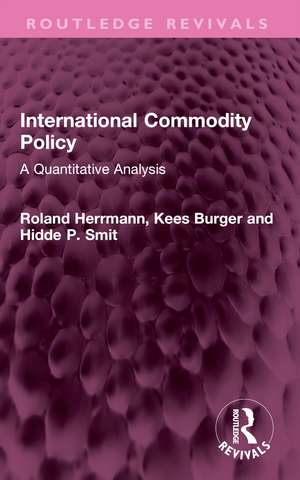International Commodity Policy: A Quantitative Analysis: Routledge Revivals
Autor Roland Herrmann, Kees Burger, Hidde P. Smiten Limba Engleză Paperback – apr 2025
Din seria Routledge Revivals
-
 Preț: 258.66 lei
Preț: 258.66 lei - 9%
 Preț: 1038.45 lei
Preț: 1038.45 lei - 9%
 Preț: 934.94 lei
Preț: 934.94 lei -
 Preț: 238.40 lei
Preț: 238.40 lei -
 Preț: 294.72 lei
Preț: 294.72 lei -
 Preț: 258.52 lei
Preț: 258.52 lei - 9%
 Preț: 903.41 lei
Preț: 903.41 lei - 18%
 Preț: 695.85 lei
Preț: 695.85 lei -
 Preț: 296.10 lei
Preț: 296.10 lei -
 Preț: 342.36 lei
Preț: 342.36 lei - 9%
 Preț: 764.28 lei
Preț: 764.28 lei -
 Preț: 317.54 lei
Preț: 317.54 lei - 9%
 Preț: 619.48 lei
Preț: 619.48 lei -
 Preț: 258.66 lei
Preț: 258.66 lei -
 Preț: 245.10 lei
Preț: 245.10 lei - 9%
 Preț: 903.80 lei
Preț: 903.80 lei - 9%
 Preț: 832.07 lei
Preț: 832.07 lei -
 Preț: 153.81 lei
Preț: 153.81 lei -
 Preț: 258.66 lei
Preț: 258.66 lei -
 Preț: 294.97 lei
Preț: 294.97 lei -
 Preț: 200.66 lei
Preț: 200.66 lei -
 Preț: 199.85 lei
Preț: 199.85 lei -
 Preț: 308.89 lei
Preț: 308.89 lei -
 Preț: 295.04 lei
Preț: 295.04 lei -
 Preț: 382.23 lei
Preț: 382.23 lei - 9%
 Preț: 606.35 lei
Preț: 606.35 lei -
 Preț: 343.21 lei
Preț: 343.21 lei -
 Preț: 258.66 lei
Preț: 258.66 lei -
 Preț: 230.80 lei
Preț: 230.80 lei - 9%
 Preț: 640.90 lei
Preț: 640.90 lei -
 Preț: 256.94 lei
Preț: 256.94 lei -
 Preț: 257.67 lei
Preț: 257.67 lei - 9%
 Preț: 801.69 lei
Preț: 801.69 lei -
 Preț: 228.88 lei
Preț: 228.88 lei -
 Preț: 259.47 lei
Preț: 259.47 lei -
 Preț: 368.93 lei
Preț: 368.93 lei - 9%
 Preț: 764.34 lei
Preț: 764.34 lei -
 Preț: 246.37 lei
Preț: 246.37 lei -
 Preț: 326.26 lei
Preț: 326.26 lei -
 Preț: 286.98 lei
Preț: 286.98 lei - 8%
 Preț: 432.15 lei
Preț: 432.15 lei -
 Preț: 258.66 lei
Preț: 258.66 lei -
 Preț: 267.15 lei
Preț: 267.15 lei -
 Preț: 295.10 lei
Preț: 295.10 lei -
 Preț: 259.68 lei
Preț: 259.68 lei - 5%
 Preț: 231.22 lei
Preț: 231.22 lei -
 Preț: 339.90 lei
Preț: 339.90 lei -
 Preț: 380.89 lei
Preț: 380.89 lei -
 Preț: 302.13 lei
Preț: 302.13 lei -
 Preț: 294.72 lei
Preț: 294.72 lei
Preț: 189.43 lei
Preț vechi: 230.02 lei
-18% Nou
Puncte Express: 284
Preț estimativ în valută:
36.25€ • 37.94$ • 30.17£
36.25€ • 37.94$ • 30.17£
Carte nepublicată încă
Doresc să fiu notificat când acest titlu va fi disponibil:
Se trimite...
Preluare comenzi: 021 569.72.76
Specificații
ISBN-13: 9781032459196
ISBN-10: 1032459190
Pagini: 326
Dimensiuni: 138 x 216 mm
Ediția:1
Editura: Taylor & Francis
Colecția Routledge
Seria Routledge Revivals
Locul publicării:Oxford, United Kingdom
ISBN-10: 1032459190
Pagini: 326
Dimensiuni: 138 x 216 mm
Ediția:1
Editura: Taylor & Francis
Colecția Routledge
Seria Routledge Revivals
Locul publicării:Oxford, United Kingdom
Public țintă
Postgraduate and Undergraduate AdvancedCuprins
Part 1: The Politics and Economics of Commodity Agreements and Compensatory Financing 1. The History of Politics of International Commodity Agreements and Compensatory Financing 2. The Economics of Stabilization: A Historical Survey Part 2: Compensatory Financing: An Economic Evaluation of Current Programmes 3. The International Monetary Fund’s Compensatory Financing Facility 4. Commodity-Related Financial Compensation by the European Community 5. Food Security and Compensatory Financing: A Discussion of the International Monetary Fund’s Cereal Import Facility Part 3: Commodity Arrangements: An Economic Evaluation of Current Programmes 6. The International Coffee Agreement 7. The International Natural Rubber Agreement 8. The International Cocoa Agreement 9. Commodity Protocols 10. A Comparison and Evaluation of the Arrangements.
Notă biografică
Roland Herrmann is Professor Emeritus of Agricultural and Food Market Analysis at Justus Liebig University, Giessen, Germany. Kees Burger, 1950-2016, was Associate Professor of Development Economics at Wageningen University and Research, Wageningen, Netherlands. Hidde P. Smit is an Independent Consultant on Analysis and Forecasts for the Rubber Economy. He was Secretary General of the International Rubber Study Group in London and Singapore (2005 – 2009) and Head of the Economic Research Division of the Economic and Social Institute, Free University Amsterdam (1995-2004).
Descriere
Originally published in 1993, provides an excellent analysis of commodity policies internationally during the late 20th Century. It discusses 2 major methods of market regulation: price stabilization – based on buffer stocks or export quotas – and compensatory finance.
